Who Is Josh Kraft?
After a lifetime of rolling up his sleeves to help people in need, the 57-year-old philanthropist with a famous last name reaches a crossroads. Does his future hold a run for Mayor of Boston?
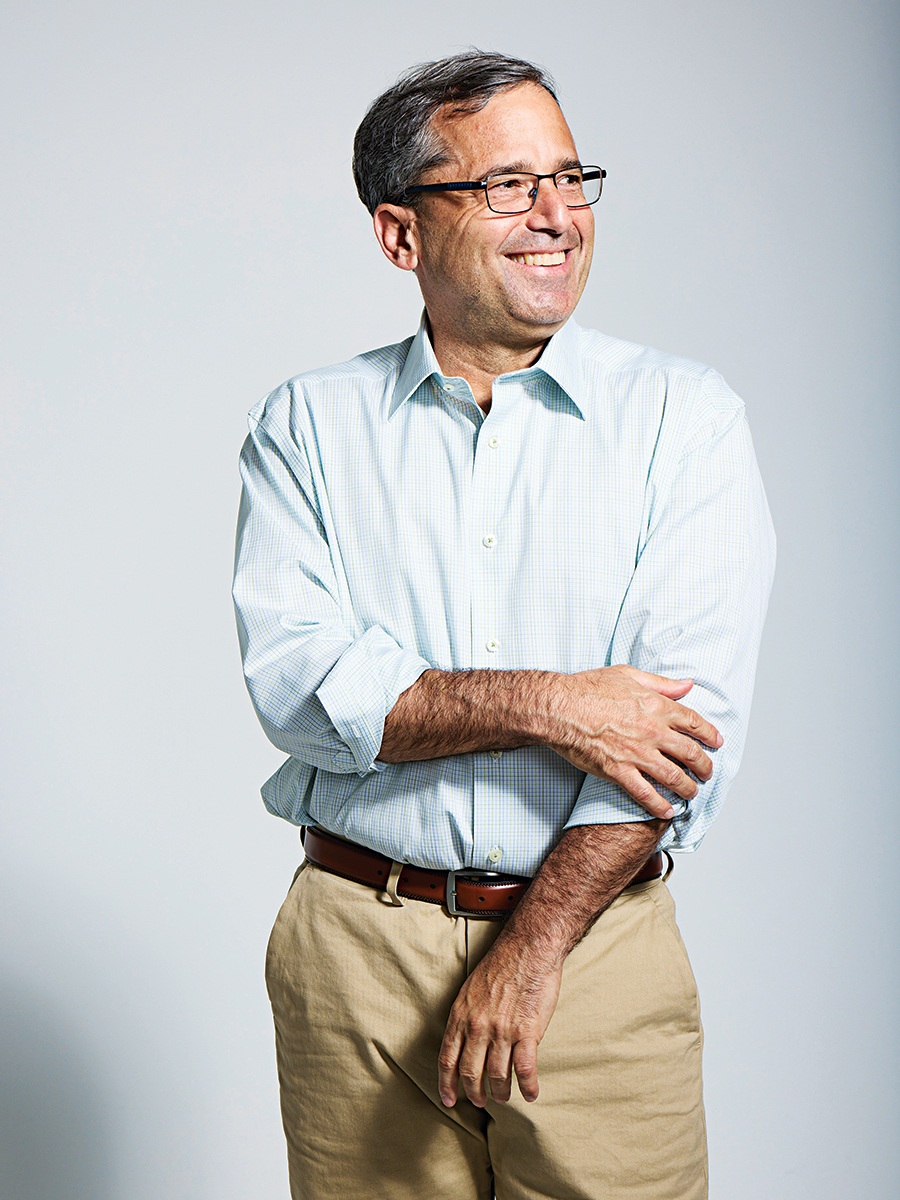
Photo by Pat Piasecki
There was a time when Josh Kraft flew under the radar. Then, all of a sudden, he was everywhere. One day, he was rubbing elbows with City Councilor at Large Henry Santana at a graduation in Roxbury; the next, he was arm-in-arm with power player Aisha Miller and mingling with a crowd of Black entrepreneurs and leaders at a women’s-empowerment breakfast. He also found time to pal around at WBUR’s CitySpace for Amplify Latinx’s Business Summit. And just when you thought he couldn’t level up any further, he hit the catwalk at Encore for Northeast Arc’s annual gala wearing a smile as bright as the spotlights illuminating the path in front of him.
For the first 30 years of his career, both at the helm of the Boys & Girls Clubs of Boston and now the New England Patriots Foundation, Josh toiled in relative obscurity, far less known—and seen—than his brother Jonathan, 60, President of the Kraft Group, or even Dan, 59, who leads International Forest Products, a subsidiary of the Kraft Group. Compared to his famously extroverted father, Robert, Josh’s profile has been radically subdued. Just a year ago, if you brought up Josh’s name around town, odds are somebody would have asked, “Wait, there’s a Josh Kraft?” Recently, though, in light of several public moves—including buying a condo in the North End that he uses as his home address, telling CommonWealth Beacon that some people around town had been encouraging him to run for the city’s top job, and regularly popping up at photo ops throughout the city like a local game of “Where’s Waldo?”—the topic dancing on the tips of so many tongues is whether Josh might actually be serious about running for mayor.
Sometimes, actions can fuel more speculation than words, and so far, Josh’s have generated a bonfire for gossip-hungry Beacon Hill. In April alone, he posted pictures from 16 different community events and fundraisers on his Instagram account. The count climbed to 18 in May and, come June, Josh was dodging confetti at a graduation parade for an eighth-grade class in Lower Mills and squinting through the disco lights at Camp Harbor View’s Beach Ball for a picture with Governor Maura Healey. Boston’s political observers took note. In fact, a lot of people did—even those who know Josh best. “I’ve been wondering, too,” said Isidra Quiñones, who worked with Josh at the Boys & Girls Clubs and has known him since just after he founded the Chelsea Club in the 1990s. “I’m like, ‘What is my homeboy doing next?’”
When I first asked Josh that very question—if his future might involve running for mayor—he offered a version of the same line he’d been using for months: “I’m looking at a lot of different things.” While politics admittedly intrigues him, Josh said he’s also thinking about pursuing the top job at another nonprofit, potentially on a national level.
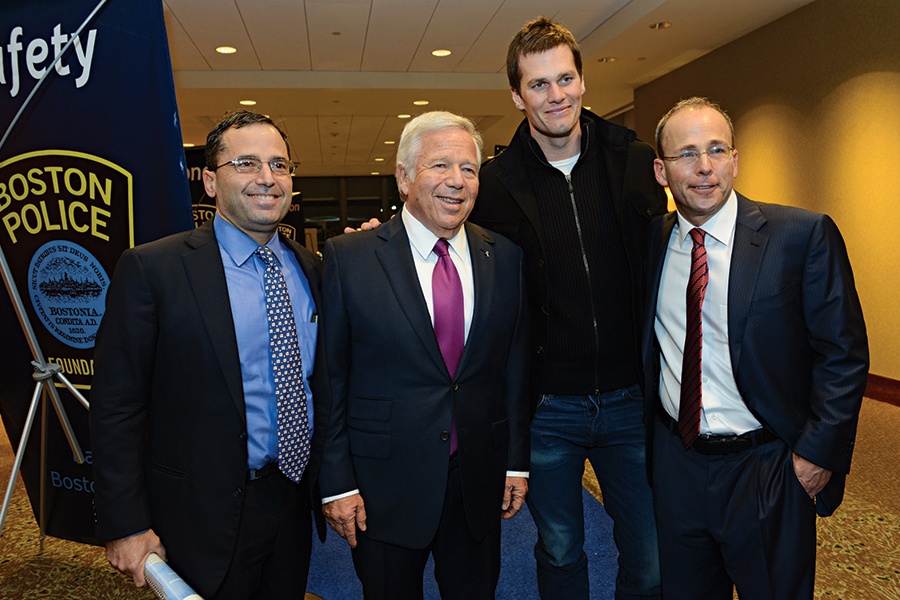
Josh hanging with his father, Robert, brother Jonathan, and Tom Brady. / Courtesy photo
No matter where he lands, what seems certain is that Josh is a man on the move. He was frank with me about his desire to move on from his post overseeing the Patriots Foundation, the philanthropic arm of his family’s football team that donates a few million dollars each year to community service organizations, and find a more challenging way to serve. But he wouldn’t specify what path he eventually may want to take.
If his next move is, in fact, a run for mayor, one challenge could be persuading voters that he’s not just some bored heir who wants to try politics for a taste of the limelight. Indeed, for those who don’t know Josh, it’s all too easy to stereotype him. Spend a little time with him, though, and a couple of things become clear.
First, he gets far more excited talking about grassroots community building than about private jets or VIP access. He also doesn’t look the part of a haughty scion; instead, he dreads the moment he has to swap his jeans and New Balance sneakers for a well-pressed suit. Chris Sumner, former head of the Boston TenPoint Coalition, remembers throwing an event at which Josh was a volunteer. When the organizers tried to stop Josh from setting up chairs and tables, “he was so pissed,” Sumner said. “He really desires to be a part of the movement.”
Second, he is also not your average Kraft. Until recently, when Josh took over the Patriots Foundation, he was the only one of Robert’s four sons who hadn’t worked full-time for the family empire. (And it’s not like the foundation is the epicenter of power within the Kraft Group.) “I always said to myself, ‘Why isn’t he taking the easy route and helping run the Patriots organization?’” says former Boston Police Commissioner Bill Evans, who worked with Josh on a program that placed social workers in police stations to help steer kids out of the criminal justice system when Josh ran the Boys & Girls Clubs. Even his father’s former players know Josh prefers the bleachers to a luxury suite. As Patriots legend Andre Tippett put it, “Josh will be in line coming into the stadium, and there he is, going through security just like everyone else—he doesn’t give a shit.” So while the question of politics and what his future holds may remain open, it’s still worth wondering: Who is Josh Kraft, and how did he end up taking his own path? “I love my family,” he told me, “but I’ve always had a need to kind of do my own thing.”
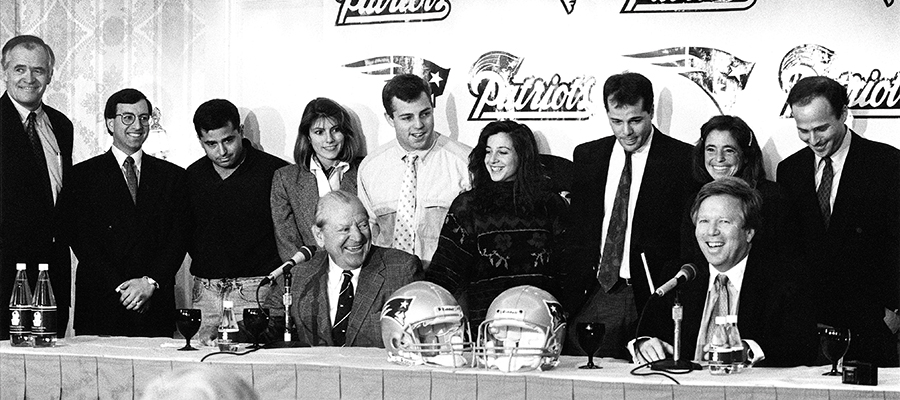
When Robert Kraft bought the New England Patriots in 1994, Josh (third from left) showed up to the signing ceremony very underdressed and almost late, because he was busy setting up a brand-new Boys & Girls Club in Chelsea. / Photo courtesy of the Kraft Group
When Robert Kraft completed his acquisition of the Patriots from James Orthwein for $172 million at the Ritz-Carlton in 1994, it marked a seminal moment for the entire Kraft family. A close look at footage of the press conference reveals a glimpse of Josh—then just 26 years old—standing a few feet behind Orthwein. In a room full of expensive-looking suits, he was the guy wearing jeans and a loose-fitting polo shirt. “I was happy for my dad and my brothers. It was a lifelong dream,” he says, adding that his attire was not some form of a statement. In fact, he says, “I felt kinda dopey because I was underdressed.”
That morning, it turned out, Josh was following his own passion until just moments before the press conference and barely made it there on time, let alone have a chance to change his clothes. That passion? Helping people. Before rushing to his father’s side, he was purchasing and dropping off a van for the new Boys & Girls Club in Chelsea, which Josh established and ran out of the basement of the Innes Housing Development on Central Avenue.
So why is this Kraft different from all of the other Krafts? Perhaps a desire to differentiate himself was an inevitable outgrowth of what he called the competitive environment of growing up as one of four brothers. It was natural for them to constantly test one another. Often, Josh would take on the role of mediator to his more rambunctious brothers. “He was never looking to put fuel to the fire,” Jonathan says. “He was always looking to make sure things didn’t escalate, that there was a peaceful resolution to what was going on.”
Still, nobody can stay level-headed forever. The sibling dynamic always heated up on the basketball court in front of the family’s house in Chestnut Hill, with Josh receiving a constant barrage of elbows and hip checks from his brothers during pick-up games. “We’d knock him around,” Daniel remembers. “But I’ll never forget, there was one day you could just see—he snapped. He was tired of getting pushed around physically and taunted mentally.” Suddenly, Josh was boxing-out his brothers under the hoop and throwing his own elbows in reckless pursuit of the ball. After that, Daniel gave his kid brother a new nickname: “the scrapper.”
Robert and Myra Kraft drilled into their boys the importance of helping others with the refrain tikkun olam, a Hebrew phrase that translates to “repairing the world.” Josh took it to heart.
If the boys competed, their parents, Robert and Myra, drilled into them the importance of helping others with the refrain tikkun olam, a Hebrew phrase that translates to “repairing the world.” Josh took it to heart, often reciting, “You’re not obligated to finish the work, but that doesn’t mean you can abstain from the work.” That religious obligation is even stronger for those born into immense wealth. “You have to look out for those who are not looked out for,” he tells me. “It’s our responsibility.”
In his mother, Josh saw a model for how to pursue this core Jewish teaching, one that extended from her service on the boards of the Boys & Girls Clubs and Brigham and Women’s Hospital to their living room in Chestnut Hill. “She’d be on the floor sorting gift packets for kids in the Ukraine,” Josh remembers. “The thing about my mother is, she did the work. She didn’t talk much about it; she just did it. She showed up.”
Though Josh followed his brother Jonathan to Williams College, his path diverged after graduation. The only thing he knew for sure was that he didn’t want to join the family business, but that left him somewhat adrift, searching for a calling that would give him a chance to succeed on his own terms. Josh briefly worked as a teacher, then took a job at the South Boston Boys & Girls Club running an outreach program for at-risk preteens. When his brothers came one day to visit with the kids, Daniel was struck by how naturally Josh seemed to fit in. “Look, here’s this wealthy kid from Chestnut Hill, and he’s in there just like one of the guys,” Daniel says now. “You can’t BS that stuff.”
Josh may have been a natural at the Southie club, but he still felt family pressure to get a graduate degree that would allow him to pursue a more traditional profession.
His first stab in that direction was law school, but that plan died after he bombed the LSAT. Thinking public policy might be a better fit, he applied to the Harvard Kennedy School—but didn’t get in. Finally, Josh received an acceptance letter to the Graduate School of Education at Harvard, but even then, he found the coursework disconnected from the sort of hands-on service his mother had modeled for him.
It was only while interning in the methadone clinic at the North Charles addiction center in Somerville that a vision for his future came into focus. Josh’s assignment was to help patients put together job résumés and also educate them about avoiding STDs. But he ended up doing much more than that. One day, Josh recalls, a patient he’d been working with escorted a friend into the building’s classroom space. He gestured toward Josh, saying, “Ask the kid over there.” The guy was named Bobby, a man in his 30s with the weathered features of someone much older. After a sheepish introduction, Bobby asked Josh, “Can you teach me how to read?”
“Definitely,” Josh said, scarcely pausing to consider the enormity of the request. “I’m not a reading teacher,” he admitted, but assured Bobby, “I’ll do my best.” After that, Josh remembers, every afternoon at the clinic became a tutoring session.
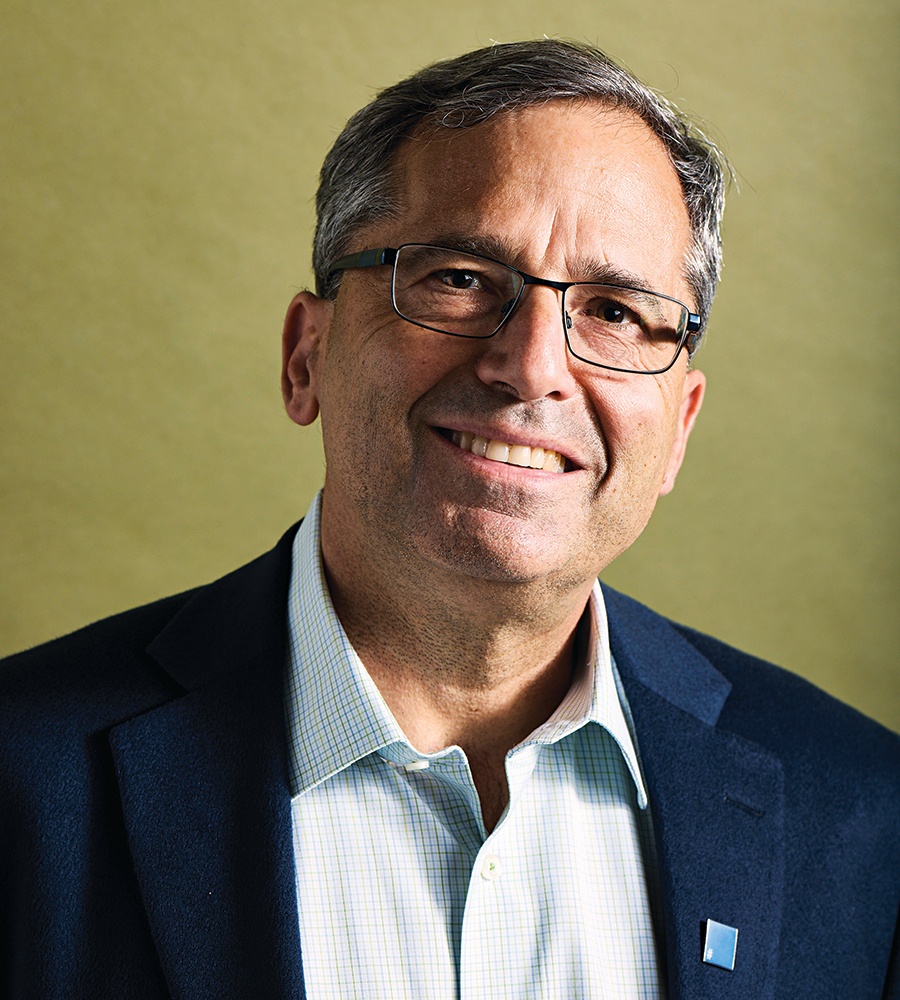
Photo by Pat Piasecki
For Josh, that unlikely friendship confirmed for him that working one-on-one with people in need could lead to tangible results. Within a few months, he was offered the perfect opportunity to do just that: Josh had planned to list Bob Monahan, his former boss at the Southie Boys & Girls Club, as a reference for a job application to Compass, a group that provides special education and foster care for underprivileged youth. But when Josh called Monahan to ask permission, his mentor mentioned that the organization was actually looking for someone to bootstrap a brand-new Boys & Girls Club into existence in the basement of a public housing building in Chelsea. Somehow, the reference call had turned into an offer. Today, Josh laughs as he recalls the conversation. “I pulled out of that other thing, and I took the job.”
Josh got a foosball table and some chairs—plus a van—and started recruiting volunteers. His scrappiness helped him connect with people in Chelsea, which was then struggling through receivership. When he was introduced to Isidra Quiñones by her high school athletic director, he asked if she’d be interested in coaching a 12-and-under team. From the beginning, Quiñones remembers, it was clear “Josh wanted to do something great in the community without any expectation of reciprocity.” Meanwhile, Vetto Casado, who now works at the Boston Foundation but belonged to the nascent club as a child, said Kraft always had “this innate authenticity about him and this groundedness that just sets him apart.”

Josh popping up at the Boys & Girls Club in Chelsea. / Courtesy photo
In 2002, the Chelsea Boys & Girls Club moved into a standalone facility, paid for with donations that Kraft spent years working to secure from donors, most notably the financier Gerald Jordan and his wife, Darlene. The renamed Jordan Club’s computer lab was a game-changer for many kids, and the club also expanded its tutoring program and organized more field trips.
Josh’s success in Chelsea made him a natural choice to take over the top job at the Boys & Girls Clubs of Boston when it became available in 2008. The next 12 years proved transformational for the organization: It expanded to Mattapan, and the operating budget more than doubled as Josh executed a $132 million fundraising campaign. Despite all these successes, Josh found himself becoming restless. When he decided to step down in 2020, Josh told me it was because “I was working really hard, but the work was no longer challenging for me.”
For years, Josh had been serving as the part-time president of the Patriots Foundation—after all, who better to run the team’s philanthropic efforts than Robert’s nonprofit-loving son? Until 2020, though, the role merely entailed driving out to Foxboro on Wednesday mornings and fielding emails and phone calls from Boston the rest of the week. Now, for the first time in his professional career, Josh decided to hop back in the nest as the face of Kraft family philanthropy. While Josh says he has enjoyed getting to see his brothers nearly every day, it didn’t take long for his mind to start wandering again. “Even though I’m showing up at events, I’m finding the work to be more passive,” Kraft says. “For me, making an impact is all about being more active.”
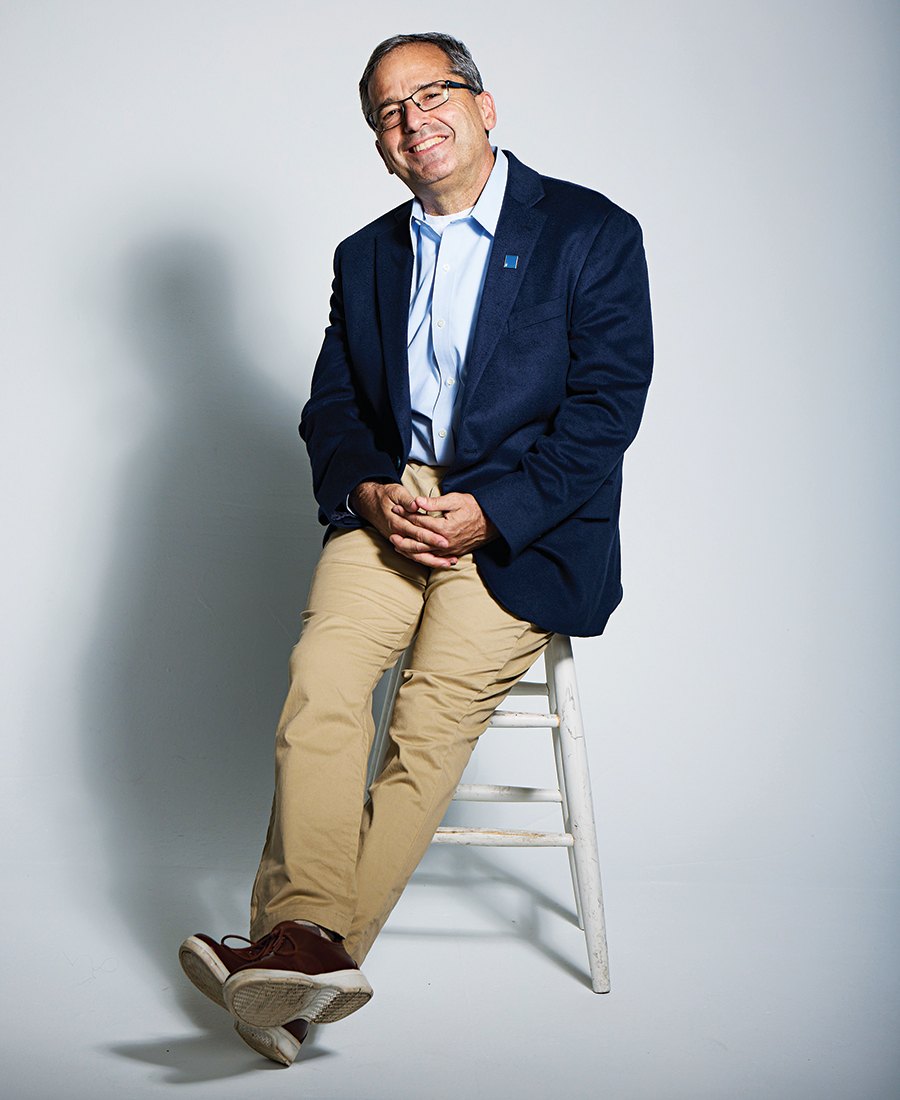
Photo by Pat Piasecki
In mid-May, Josh suited up and breezed through Foxboro stadium on his way to a luncheon honoring the Patriots Foundation’s corporate partners. A quick nod to the field below, and he was all business, shaking hands with bigwigs from Bank of America, Cross Insurance, and Gillette. His slideshow presentation? Check. His game face? On. Josh was ready to play ball.
As the guests sat politely around tables decorated with flower bouquets and Patriots caps, Josh shared the foundation’s recent accomplishments: nearly $1.5 million in grants to local nonprofits, more than 1,200 “care kits” donated to homeless individuals, and more than 3,000 veterans reached with community programming.
Josh takes pride in what the Patriots Foundation has accomplished since he took over four years ago. “I think we’ve gotten a little more creative and impactful,” he would later tell me. Still, his muted, by-the-numbers presentation that day suggested his dissatisfaction with his role at the foundation, which feels less hands-on than he’d prefer. “You’re not really in [the community], saying ‘Hey, you should really connect with this person’ or ‘let’s figure out a way to make that happen,’” Josh said.
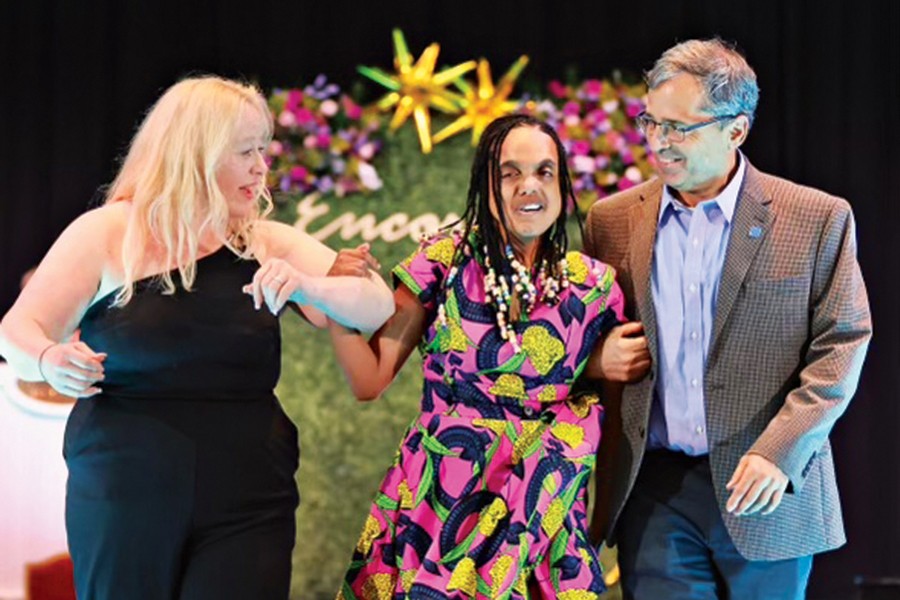
Josh walking the runway at Northeast Arc’s annual gala. / Courtesy photo
Just two days before, I caught a glimpse of Josh back in the environment where, unlike at his current job, he felt like he could really roll up his sleeves and do the work. He’d stopped by the old club in Chelsea for a celebration honoring the life of Carmen Nieves, who worked the front desk for more than two decades until her death in 2019. Josh arrived with his partner, Michelle Perez Vichot, the CEO of the Boys & Girls Clubs of Greater Billerica. He was wearing a flannel shirt and jeans while holding a box of Italian cookies from Mike’s Pastry—right around the corner from the couple’s new home in the North End. Strolling through the back door, Josh’s first move was to drop off the cookies in the cafeteria decorated with a mural of dancing vegetables, but longtime volunteer Nicollette intercepted him. “You lookin’ good Joshy-Josh! You back in your ’hood?” Josh wrapped his arms around her in a hug, then flagged down a gawky teenager: “I haven’t seen you since you were this tall! How’s your father? Tell him I’m still better than him at soccer.”
After Josh made the rounds—offering to help get the stereo system hooked up and making sure a few old friends playing with their kids in the gym had something to drink—Quiñones called him into the cafeteria to give a short speech. Josh talked about the foundational role Nieves played at the club, then quickly turned the floor over to a couple of club alums so they could share their own memories of Nieves. Josh beamed throughout the event, hooting with laughter during one anecdote and shouting out support to the nervous speakers along with their parents. “Outside my family,” Josh told me later, “my happiest memories are at the Chelsea club.”
Perhaps that’s one of the reasons why Josh’s brothers support his desire to once again do his own thing by stepping away from the family business. “It’s been great having him in the fold,” Daniel says. “We bust each other’s balls or just sit and talk.” But as Jonathan puts it, Josh has bigger things to tackle: “Josh really has the potential to affect large numbers of people when he combines his empathy, his intellect, and his work ethic.”
With Boston’s preeminent newspaper suddenly championing his potential candidacy, the notion of “Mayor Kraft” moved from wild speculation to real possibility.
On the morning of May 24, Boston Globe readers woke up to a stunner: the paper’s politically progressive editorial board extolling the idea of Josh running for mayor and, in doing so, giving Bostonians a potentially competitive race next year. “Kraft’s history in the community,” the paper stated, “would be a political asset,” as would his familiar name.
The rumors had already been circulating around town, plus there was that CommonWealth story in which Josh admitted that some people were suggesting he run. But now, with Boston’s preeminent newspaper suddenly championing his potential candidacy, the notion of “Mayor Kraft” moved from wild speculation to real possibility.
A few hours later, I sat down with Josh over coffee at a café inside the Roche Brothers in West Roxbury. When I asked how he felt about the Globe editorial, he said the level of attention was “definitely different” than he’d received before. Still, even being touted by Boston’s paper of record wasn’t enough to make Kraft say he was definitely throwing his hat in the ring. “Anything I’m looking to do, I know getting there is going to be hard,” he said. His plan, he added, was to “keep moving forward, take community opportunities as they come, and see where it leads.”
Because Josh has no real public policy experience to speak of, I tried to get a better sense of what, exactly, he thinks needs to change about Boston. “There’s a number one thing,” he said, “and it’s that people used to be able to disagree, but it didn’t bring out hate, vitriol, or anger. There’s a generation, a younger generation, that feels as though if people don’t listen to them or agree with them, they’re just wrong, and they shut them out. And that’s no way to move forward.”
Fair enough, but that didn’t exactly answer my question. What about more concrete policy ideas? I asked. What about the affordability crisis or declining school enrollment? What specifically do you want to be a part of fixing?
Josh’s face knit up in thought. “I spent my life creating access to opportunity,” he said. “So there are ways to improve access to opportunity with the basics of life: housing, education, making those opportunities stronger and increasing their accessibility.” Improving access to opportunity is a laudable goal, but as the supermarket PA crackled overhead, he demurred from offering any further explanation of how he might actually make that happen.
Even if he is short on specifics at this early juncture, many people in town are energized by the possibility of a Josh Kraft mayoral run. Sumner, who now serves as a pastor at the Jubilee Christian Church in Mattapan, says he looks forward to being able to cast a ballot for Josh, who he has seen connect with Boston’s Black and brown communities. “We have a lot of Caucasian people who get into this work with a real saviorism mindset, and they create more harm than help. That’s not Josh,” he said. “There are those who want to be the mayor, and then there are those who are called to be the mayor. Those who are called to be the mayor are the ones who bring a level of leadership that brings unity in the city versus division.”
Between his humility and compassion, Josh cuts the figure of a unifier. But does Boston need a unifier? Or is the sense of division overblown, a narrative pushed in part by people upset with Mayor Michelle Wu’s agenda, including real estate investors unhappy with her approach to development?
Despite dissatisfaction with Wu in some quarters, history has proven that beating an incumbent will be tough. “It would be difficult for any challenger to overcome the advantages [Wu] has right now,” says one longtime campaign consultant. “I don’t see anyone who could fundamentally turn the voter turnout model on its head in their favor. Money helps, and Josh would likely have plenty, but she has all of the premier organizational forces at her disposal and pretty high favorability amongst the people who will actually vote.” Meanwhile, as Democratic political consultant Mary Anne Marsh put it, “There’s a school of thought in Massachusetts politics that if you have name recognition and deep pockets, you can be a contender. But if Josh Kraft were to run for mayor, he would have to prove that he would be a better mayor than Michelle Wu. They’re not going to measure him on the job he did at the Boys & Girls Club; he won’t be measured on the job he’s done with the Patriots Foundation. He will be measured on one question: Will you be a better mayor?”
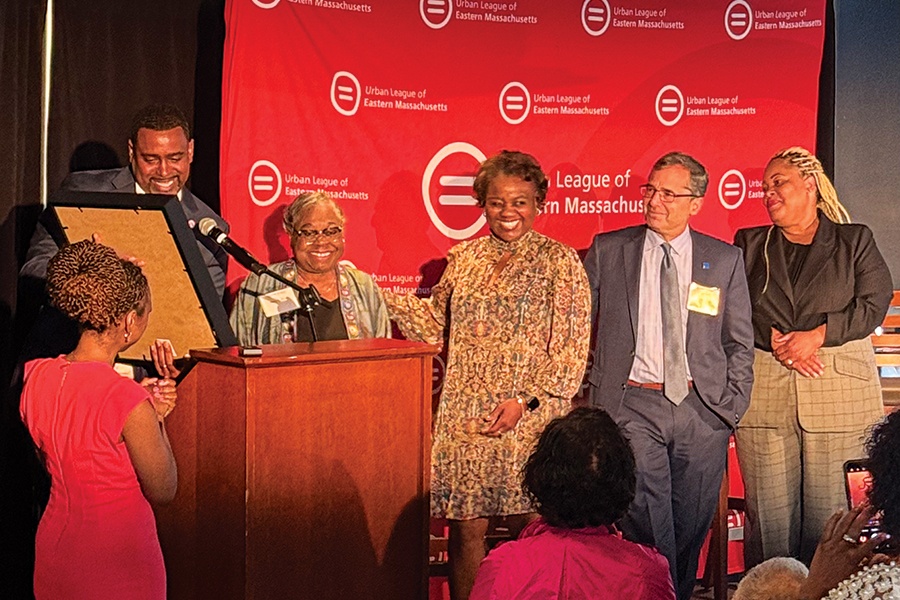
Josh Kraft has been on a whirlwind of public appearances lately, including this event organized by the Urban League of Eastern Massachusetts. / Courtesy photo
I realized that a speech I heard Josh give at an Urban League of Eastern Massachusetts event in May served as something like a proof-of-concept for his potential pivot to politics. Josh sought to connect with the audience—many of whom were likely unfamiliar with him or surprised to find the Urban League’s board chair was a white man—by sharing a personal anecdote that linked his mother’s memory with honoree Mary Reed, who grew her mother’s daycare into a network of three South End pre-Ks. “If you ever mentioned Mary Reed in front of my mother, oh my God, she’d be like, ‘If you have a chance to talk to her, you listen to everything she says!’ She loved Mary Reed.” Kraft paused as the audience applauded. “I know you guys share the same values I just mentioned: compassion, community, inclusivity, love for everybody, because it’s the only way we drive our communities forward.”
To win over Boston voters who might be skeptical of his background, it appears that Josh recognizes the best course of action isn’t hiding from his family name but embracing it in a way that demonstrates the depth of his commitment to lifting up people in need. In effect, the message he’s trying to broadcast through his countless public engagements seems to be: You’re damn right I’m a Kraft, and that name stands for more than just dollar signs and football. There are all kinds of Krafts, including my mom and me.
Then again, don’t be surprised if, after a few months of public back-and-forth, Josh rides off into the sunset to do the work of improving access to opportunity in a more private setting. “He has immense credibility as it relates to really understanding the mission and the levers you have to pull on to deliver it,” said Dave Johnson, an advisory partner at Bain & Company who worked with Josh on the Boys & Girls Clubs’ board. “I think he could be—should be—a candidate to be the next CEO of Boys & Girls Clubs of America.”
When I floated that idea to Josh, he nodded knowingly. “I love the organization. I love everything about it.” That said, “I know that Jim Clark, the CEO, is locked in, and he and I have a great relationship.”
That day at Roche Brothers, Josh insisted to me that he takes nothing about his future for granted. Then he took a lengthy moment to think, as if compelled to make something clear that he feared all his hemming and hawing about the potential mayoral run might have obscured. “Whatever I do,” he finally continued, “when I get there, I can make one promise: No one will work harder than me.”
That sure had the ring of a campaign promise to me. In June, before my deadline for this story, I asked Josh once again about the state of the city, ultimately hoping to get some insight as to where he stood on his decision. “That’s a question for someone who’s running for mayor,” he told me. He seemed like he was being coy. But I couldn’t tell for sure.
First published in the print edition of the August 2024 issue with the headline, “Who is Josh Kraft?”


